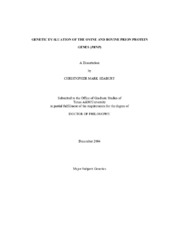| dc.description.abstract | Transmissible spongiform encephalopathies (TSEs), or prion diseases, are a
group of inevitably fatal neurodegenerative diseases that occur in mammalian species.
Ovine susceptibility to scrapie, the prototypical TSE, is predominantly modulated by
nonsynonymous polymorphisms within exon 3 of the ovine prion protein gene (PRNP).
Investigation of PRNP exon 3 for two hair-sheep breeds revealed a novel predicted
amino acid substitution (P116) associated with the ovine ARQ allele (P116A136R154Q171).
Additionally, two novel ovine PRNP genotypes (PARQ/ARR; PARQ/ARQ) also were
detected, and most of the hair sheep sampled possessed PRNP exon 3 genotypes
associated with some degree of resistance to scrapie and/or experimental BSE (bovine
spongiform encephalopathy).
Unlike sheep, expression of bovine spongiform encephalopathy (BSE) in cattle
and other bovids has not been associated with nucleotide variation within bovine PRNP
exon 3. However, BSE susceptibility has been tentatively associated with specific
insertion-deletion (indel) polymorphisms within the putative bovine PRNP promoter,
and to a lesser extent intron 1, for a few German cattle breeds. Evaluation of the patterns
of nucleotide variation associated with bovine PRNP exon 3 provided evidence that
strong purifying selection has intensely constrained bovine exon 3 over the long-term
evolutionary history of the subfamily Bovinae, as well as evidence for significant
purifying selection in regions of bovine PRNP exon 3 that are considered to be of
functional, structural, and pathogenic importance in other mammalian species.
Evaluation of the frequencies of known indel polymorphisms within the putative bovine
PRNP promoter for a panel of U. S. cattle sires revealed no significant differences in the
distribution of promoter alleles and/or genotypes between U. S. cattle sires and BSEaffected
German cattle.
Notably, a nonsynonymous PRNP exon 3 polymorphism (T50C) identified in
American bison (Bison bison) was tentatively associated with Brucella spp.
seropositivity. Specifically, a significant overabundance (P = 0.021) of Yellowstone
National Park bison possessing the CC genotype were Brucella spp. seropositive.
Furthermore, the T-allele and TT genotype were observed at significantly higher
frequencies in three bison populations that were either founded from Brucella spp.
seronegative stock or previously subjected to test-and-slaughter management to eradicate
brucellosis. | en |


